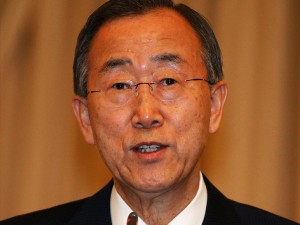NUSA DUA — UN Secretary General Ban Ki-moon told Asian business leaders Friday that their region was growing in wealth but not doing its share to help the world’s poorest.
“While Asia gains in power and influence, it has not yet begun to take its proper share of responsibility,” Ban told the executives at an Asian investment conference on Indonesia’s Bali island.
“Asia has not taken a proper role in the international community for the world that we share. That is the message I will deliver to world leaders” at the 18-nation East Asia Summit on Saturday, Ban said.
With President Barack Obama attending the regional grouping that will for the first time take in the United States and Russia, Ban said he wanted to speak about “an issue that keeps me up most nights” and let others discuss political and economic challenges.
One of the most pressing issues in the world was healthcare for the world’s poorest women and children, he said.
“Remember that the health of women and children is core to everything, starting with the productiveness of your own workforce,” Ban told his audience, describing women and children as “the foundation stone of social progress”.
“I am asking you to step up and recognise your place in this new world and help the UN help those who are less fortunate.”
Asia’s economies have weathered the economic storm better than most of the rest of the world, and the region is maintaining relatively strong growth rates.
Ban added that governments did not need to wait to grow wealthy before launching healthcare initiatives.
He noted that Thailand had launched healthcare programmes while still a relatively poor country, and that Bangladesh had taken impressive steps in providing healthcare to its poorest.
Ban pointed out that the UN Global Compact, an initiative to encourage businesses worldwide to adopt sustainable and socially responsible policies, had been able to raise $40 billion in only a year.
“Why and how could we mobilise $40 billion in just one year in this time of economic crisis?” Ban asked.
“Because this is a moral imperative, because the health of women and children matters to all of you and all of us personally and fundamentally.
“But we need more, and when women and children die needlessly from disease or complications of childbirth that can be prevented it’s a tragedy, it’s a tragedy of the world because these deaths can be easily prevented.”
